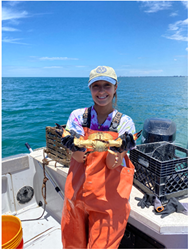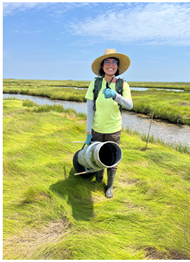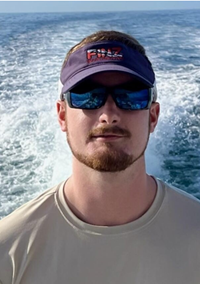GCA Coastal Wetlands Scholarship Award Recipients
Congratulations to the 2025 Coastal Wetlands Studies Scholarship Recipients!

Talia Barry
Ph.D. Candidate, Rutgers University
Research Title: Predator-Prey Dynamics on Oyster Reefs and Implications for Restoration Efforts
Summary: Conducting experiments in the laboratory on the interactions between blue crabs and oyster drills and how this impacts predation on juvenile oysters; and, examining the impact of habitat complexity and number of trophic levels on oyster predation.
Study Site: New Jersey (Delaware Bay), Florida (Gulf of Mexico)
Award: $5,000

Elizabeth MacDougal
Ph.D. Candidate, Tulane University
Research Title: Environmental vs. Biological Influences on Baldcypress Endophytes
Summary: Bald cypress have microbes in their roots that may help them adapt to stresses like sea level rise. These microbes are likely influences by water level, salinity, baldcypress genotype, and the shape of the baldcypress roots they live in. This study looks at how these things influence which microbes are present and what this means for baldcypress swamp conservation and restoration.
Study Site: Louisiana
Award: $5,000

Vanessa Morales
Ph.D. Candidate, Georgetown University
Research Title: Investigating the Importance of Genetic Diversity in a Salt Marsh Foundation Species in an Era of Human Driven Global Change
Summary: As biodiversity is lost across many ecosystems, the effects are felt most acutely in those with limited genetic diversity, such as salt marshes. As salt marshes are being threatened from both sides, the role of genetic diversity within grass species is all the more important. This study aims to study how genetic diversity can buffer salt marsh against disturbances, including sea level rise and nutrient input from inland sources.
Study Site: New Jersey
Award: $5,000
 Emily Santos
Emily Santos
Ph.D. Candidate, Utah State University
Research Title: Integrating Above and Belowground Traits: Unravelling Plant Responses to Climate Change
Summary: Coastal high-latitude ecosystems face significant climate change impacts, including shifts in migratory bird timing and abundance, with implications for vegetation and ecosystem function. This project examines how increased warming, flooding, and herbivory impact on aboveground and belowground traits of wetland species in the Yukon-Kuskokwim Delta, Alaska.
Study Site: Alaska
Award: $5,000

Chase Wunder
Masters Student, Rutgers University
Research Title: Acoustic Telemetry and Autonomous Surface Vehicles (AUVs): Mapping Habitat Use of Summer Flounder in a Salt Marsh Subtidal Creek
Summary: Summer flounder serve as the bread and butter for the recreational fishing industry in New Jersey and an important ecological connection between tidal marsh and estuaries and the continental shelf. Acoustic telemetry, economic tagging, paired with benthic mapping from an autonomous surface vehicle (ASV) offers an opportunity to investigate habitat use of summer flounder that will help identify and predict how estuary dependent species may respond to future climate and anthropogenic driven change.
Study Site: Little Sheepshead Creek, New Jersey
Award: $5,000

